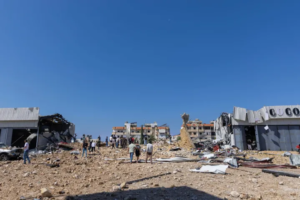UN discussions lead to 21-Day ceasefire proposal along Israel-Lebanon border

Following extensive deliberations at the United Nations, the US, together with allies France, Australia, and Saudi Arabia, has proposed for a 21-day agreement along the Israel-Lebanon border. This ceasefire would apply to the Blue Line, which separates Israel and Lebanon, and is intended to facilitate negotiations toward a diplomatic resolution of the continuing conflict. This approach also includes backing for a cease-fire in Gaza, where hostilities are intensifying.
The ceasefire proposal comes amid growing violence, with Israeli bombings intensifying in Lebanon, killing at least 72 people and prompting fears of a wider regional battle. The Lebanese government, led by Prime Minister Najib Mikati, has encouraged the international community to put pressure on Israel to stop its strikes, with the intention of reaching an agreement quickly. Meanwhile, Israeli authorities have expressed openness to a cease-fire, but insist that Iran and Hezbollah be addressed as the origins of the bloodshed.
US President Joe Biden has been actively pressing for this ceasefire in contacts with foreign leaders, hoping to convert ongoing negotiations into real agreements during this 21-day timeframe.
The situation in Lebanon has deteriorated significantly. Israeli airstrikes have stepped up, with recent bombings killing at least 72 people and displacing hundreds. Hospitals are overburdened with injured people, and many Lebanese residents are migrating south to safer locations further north. Lebanese Prime Minister Najib Mikati has condemned the attacks and called for quick international pressure on Israel to cease operations.
In response, Israel has justified its actions as necessary to degrade Hezbollah’s capabilities, which it considers a grave danger to its security. Danny Danon, Israel’s UN ambassador, emphasized his openness to explore a diplomatic solution but insisted that peace in the area involves tackling Iran’s influence, particularly its support for Hezbollah.
The cease-fire plan comes at a critical time, but it faces significant challenges. Although Israel has suggested that it is willing to negotiate a ceasefire, its military chief has cautioned that a physical invasion of Lebanon is still possible. Meanwhile, Hezbollah continues to fire missiles into northern Israel, keeping tensions high.


